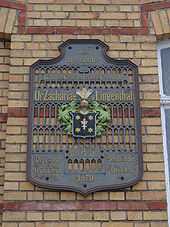Karl Eduard Zachariae von Lingenthal

Karl Eduard Zachariae von Lingenthal (born December 24, 1812 in Heidelberg , † June 3, 1894 in Großkmehlen ) is considered one of the most important German legal historians. His area of expertise was Byzantine legal history .
Life
Karl Eduard Zachariae was born in 1812 as the son of the Heidelberg law professor Karl Salomo Zachariae . He achieved his title of nobility after his father was raised to hereditary nobility in 1842 as the owner of the Lingental estate . He attended the Fürstenschule Sankt Afra zu Meißen and then studied philosophy, history, philology, mathematics, modern languages and law in Leipzig , Heidelberg , Berlin and again in Heidelberg from 1829 to 1834 . His academic teachers included Anton Friedrich Justus Thibaut , his father Karl Salomo Zachariae, Carl Joseph Anton Mittermaier , Friedrich Carl von Savigny and Friedrich August Biener (1787–1861); especially von Savigny and Biener influenced his scientific career. The 1848 revolutionary Friedrich Hecker and Albert Sprengel , who later became a member of the Frankfurt National Assembly , and the Shakespeare researcher Karl Gisbert Friedrich von Vincke belonged to his student environment in Heidelberg ; his fellow law student Theodor Hoffmeister (1812-1834) drew a youth portrait of Zachariae in 1832.
After completing the state examination , he traveled to Paris in 1834 to research Byzantine manuscripts and on to Brussels , London , Oxford , Dublin , Edinburgh and Cambridge . In 1836 he completed his habilitation at the University of Heidelberg and in 1837/38 undertook another scientific trip that took him to Athens , Saloniki , Mount Athos , Constantinople and Trebizond . In 1841 he became a member of the Spruchkollegium and in 1842 an associate professor in Heidelberg. In 1845 he decided to give up his university career, acquired part of the Großkmehlen manor , set up an agricultural research station there and lived there until his death in 1894.
In Großkmehlen he was also politically active in addition to his agricultural activities. In 1850 he was elected to the Erfurt parliament by his local Liebenwerda district, where he joined the Stahl faction , which later became the Kreuzzeitung party , and took an active part in the legislative work. After the dissolution of the Erfurt parliament, he remained loyal to the same faction and continued to belong to it as a member of the House of Representatives from 1852 to 1855 and again from 1866 on. He was also a member of the provincial parliament of the province of Saxony . The Cottbus-Großenhainer Eisenbahn owes its existence mainly to him. From 1869 to 1876 he was their director and that of the Oberlausitzer Eisenbahn-Gesellschaft .
As a practical and theoretical farmer , he was one of the first to recognize the importance of chemistry for agriculture and to put Liebig's theories and the views of his friends Reuning and Weinlig into practice. He made a particularly good contribution to regulating the river and floodplain of the Black Elster , cultivating the Schraden , promoting road construction and setting up the agricultural experimental station, which was then moved to Halle and connected to an agricultural school. The focus of his activities, however, always remained his legal studies.
Since 1856 he was a corresponding member of the Russian Academy of Sciences in Saint Petersburg and since 1866 of the Prussian Academy of Sciences .
His son Karl Georg Zachariae von Lingenthal (1842–1907) was a member of the Prussian House of Representatives and the Brandenburg Provincial Parliament.
Fonts (selection)
- Fragmenta versionis Graecae legum Rotharis Longobardorum regis , Heidelberg 1835 ( online edition )
- Zachariä's Journey to the Orient Heidelberg 1840 online
-
Ius graeco-romanum ( la ), Volume 2. Weigel, Leipzig 1856.
- Ius graeco-romanum ( la ), volume 7. Hirschfeld, Leipzig 1884.
Literature (selection)
- William Fischer: Zachariae von Lingenthal, Karl Eduard . In: Allgemeine Deutsche Biographie (ADB). Volume 44, Duncker & Humblot, Leipzig 1898, pp. 653-657.
Web links
- Literature by and about Karl Eduard Zachariae von Lingenthal in the catalog of the German National Library
- Zachariä von Lingenthal, Karl Eduard . Publications in the bibliographic database of the Regesta Imperii .
- Berlin-Brandenburg Academy of Sciences and Humanities, selected references from the holdings of the academy library: Karl Eduard Zachariae von Lingenthal, legal historian (PDF file; 45 kB)
Individual evidence
- ↑ Dieter Lent: A Brunswick student portrait album from the University of Heidelberg with an unknown youth portrait of the revolutionary leader Friedrich Hecker. In: Braunschweigisches Jahrbuch für Landesgeschichte. Volume 79, 1998, pp. 139–166 (portrait of Zachariaes on p. 151).
- ^ Foreign members of the Russian Academy of Sciences since 1724. Karl Eduard Zachariae von Lingenthal. Russian Academy of Sciences, accessed November 5, 2015 .
- ^ Members of the previous academies. Karl Eduard Zachariae von Lingenthal. Berlin-Brandenburg Academy of Sciences , accessed on November 5, 2015 .
| personal data | |
|---|---|
| SURNAME | Zachariae von Lingenthal, Karl Eduard |
| BRIEF DESCRIPTION | German legal historian |
| DATE OF BIRTH | December 24, 1812 |
| PLACE OF BIRTH | Heidelberg |
| DATE OF DEATH | June 3, 1894 |
| Place of death | Large flour |
